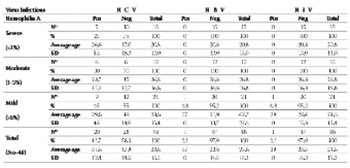Transfusion-Transmitted Infections in Haemophilia Patients
DOI:
https://doi.org/10.17305/bjbms.2009.2777Keywords:
hepatitis C Virus (HCV), hepatitis virus B (HBV), Human immune deficiency Virus (HIV), Hemophilia A and Hemophilia BAbstract
One of the largest therapeutic problem during the continuous treatment of the patients with Hemophilia A and B, are viral infections as Hepatitis B and C, and HIV, and the other infective diseases, which can be transmitted by the transfusion of blood products.
The aim of this study is to analyze the complications of the hemophiliacs in Kosovo which have been treated with fresh frozen plasma, cryoprecipitate and concentrated products of FVIII and FIX. We have tested 75 patients with hemophilia A or B and there were used enzyme immunoassay test-Elisa method for the following: anti-HCV HBsAg, HIV and TPHA.
The serological data showed that HCV infection was positive in 29 cases or 38,7%, whereas infection with HBV and HIV were present in a smaller percentage of the patients (2,7% HBV and 1,4% for HIV). HCV infection was present only in 9,5% of the cases of the age group under 18 years. Infected hemophiliacs with one or two infective agents were found in 34,7%, respectively 4%. Infection with T. pallidum was present at none of the examined patients with hemophilia. HCV infection was higher in severe forms of hemophilia B (44,4%), compared with severe form of hemophilia A (30%).
Based on our results, despite the infrequent application of FVIII and FIX concentrates, and other anti hemophilic preparations used in treating hemophilia patients, the number of infected hemophiliacs with blood-transmittable infectious agents was substantially high, especially with hepatitis C virus.
Citations
Downloads

Published
Issue
Section
Categories
How to Cite
Accepted 2017-12-07
Published 2009-11-20









